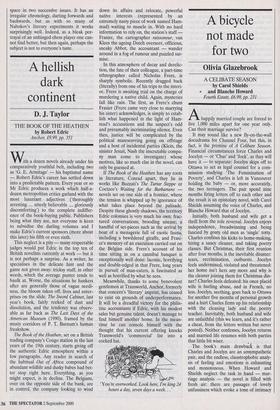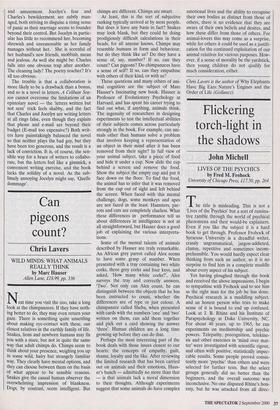A bicycle not made for two
Olivia Glazebrook
A CELIBATE SEASON by Carol Shields and Blanche Howard Fourth Estate, £6.99, pp. 231 Ahappily married couple are forced to live 1,000 miles apart for one year only. Can their marriage survive?
It may sound like a new fly-on-the-wall docudrama for Channel Four, but this, in fact, is the premise of A Celibate Season. Financial circumstances force Charles and Jocelyn — or 'Chas' and 'Jock', as they will have it — to separate: Jocelyn skips off to Ottawa to act as legal counsel for a com- mission studying 'The Feminization of Poverty', and Charles is left in Vancouver holding the baby — or, more accurately, the two teenagers. The pair spend nine months firing letters off to each other and the result is an epistolary novel, with Carol Shields assuming the voice of Charles, and Blanche Howard that of Jocelyn.
Initially, both husband and wife get a thrill from the role reversal. Jocelyn enjoys independence, breadwinning and being fancied by goaty old men as 'single' totty. Charles confines his kicks to home-making, hiring a saucy cleaner, and taking poetry classes. But Christmas, their first reunion after four months, is the inevitable disaster: tears, recrimination, outbursts. Jocelyn feels undermined, violated and threatened: her home isn't hers any more and why is the cleaner joining them for Christmas din- ner? Charles feels defeated: his once placid wife is hurling abuse, and in French, no less. Jocelyn, seething, goes back to Ottawa for another five months of personal growth and a hurt Charles firms up his relationship with the cleaning lady and the poetry teacher. Inevitably, both husband and wife are unfaithful (this we learn, and it's rather a cheat, from the letters written but never posted). Neither confesses, Jocelyn returns and married life resumes with both parties that little bit wiser. . i. The book's main drawback is that Charles and Jocelyn are an unsympathetic pair, and the endless, claustrophobic analy- sis of feeling and emotions is exhausting and monotonous. When Howard and Shields neglect the task in hand — mar- riage analysis — the novel is filled with fresh air: there are passages of lovely unfussiness which evoke a tone of intimacy and amusement. Jocelyn's fear and Charles's bewilderment are subtly man- aged, both striving to disguise a rising sense of panic as their marriage seems to founder beyond their control. But Jocelyn in partic- ular has little to recommend her, becoming shrewish and unreasonable as her family manages without her. She is scornful of her husband's new friends, snobbish, mean and jealous. As well she might be: Charles falls into one obvious trap after another. The cleaning lady? The poetry teacher? It's all too obvious.
The trouble is that a collaboration is more likely to be a drawback than a bonus, and so is a novel in letters. A Celibate Sea- son cannot overcome the limitations of an epistolary novel — the 'letters written but not sent' trick feels shabby, and the fact that Charles and Jocelyn are writing letters at all rings false, even though they explain that phone and e-mail are beyond their budget (E-mail too expensive?) Both writ- ers have painstakingly balanced the novel so that neither plays the bad guy, but they have been too generous, and the result is a lack of conviction. It is, of course, the sen- sible way for a brace of writers to collabo- rate, but the letters feel like a gimmick, a convenient writing exercise, and the book lacks the solidity of a novel. As the sub- limely annoying Jocelyn might say, 'Quelle dommage'.



























































 Previous page
Previous page